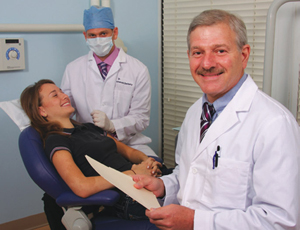TMJ Ankylosis Treatment in North Miami Beach, FL
What is TMJ Ankylosis?
Temporomandibular joint (TMJ) ankylosis, or bilateral temporomandibular joint ankylosis, is a severe condition where the jaw joint becomes fused or immobilized. This prevents normal jaw movement, making it difficult to talk, chew, or yawn. If you’re dealing with chronic jaw pain, contact our dentist in North Miami Beach, FL today to schedule a temporomandibular joint evaluation. Call us at (305) 945-0909 to get started.
Types of TMJ Ankylosis
- Traumatic: Caused by injury or trauma to the jaw.
- Infection-related: Resulting from infections in the TMJ area.
- Rheumatoid: Caused by rheumatoid arthritis.
- Congenital: Present from birth.
- Fibrous: Involves fibrous tissue growth in the joint.
- Bony: Involves bone fusion.
- Myofibroblastic: Characterized by myofibroblast presence.
- Fibro-osseous: Involves both fibrous tissue and bone.
 Causes of TMJ Ankylosis
Causes of TMJ Ankylosis
- Jaw trauma: Accidents, sports injuries, or falls can cause trauma to the TMJ.
- Infection: Infections in the TMJ area can lead to inflammation and scarring.
- Genetic factors: Some people may be genetically predisposed to TMJ ankylosis.
- Rheumatoid arthritis: This autoimmune condition can damage the TMJ.
- Poor oral hygiene: Infections can spread to the TMJ.
Symptoms of TMJ Ankylosis
- Pain and discomfort in the jaw joint
- Stiffness or limited movement of the jaw
- Difficulty opening or closing the mouth
- Clicking or popping sounds when opening or closing the mouth
- Headaches
- Earaches
- Facial swelling
- Difficulty eating or swallowing
- Changes in facial appearance
Who Can Develop TMJ Ankylosis?
Anyone can develop bony ankylosis, regardless of age or gender. However, certain factors may increase your risk, including:
- Trauma
- Infection
- Inflammatory disorders
- Congenital factors
- Prior surgery or dental procedures
- Untreated TMJ conditions
- Certain medical conditions such as diabetes or autoimmune disorders
Treatment for TMJ Ankylosis
- Medications: Pain relievers, anti-inflammatory drugs, and antibiotics may be prescribed to manage tmj ankylosis.
- Oral and maxillofacial surgery: Surgical treatment may be used to release the fused joint and restore movement. These can include:
- Arthrocentesis: A maxillofacial surgery to flush out the joint and remove any debris.
- Arthroscopy: A minimally invasive procedure using a small camera to visualize and treat the joint.
- Open joint surgery: Also known as temporomandibular joint reconstruction, a more invasive procedure to access and repair the joint.
- Physical therapy: Exercises and stretches can help improve joint function and soft tissue health.
- Orthodontic treatment: Braces or splints may be used to stabilize the jaw.

Preventing TMJ Ankylosis
While it’s difficult to prevent TMJ ankylosis completely, you can take steps to reduce your risk:
- Practice good oral hygiene.
- Wear protective gear during high-risk activities.
- Seek prompt treatment for jaw injuries.
- Manage underlying conditions.
- Get orthodontic treatment if needed.
- Manage stress.
- Maintain a balanced diet.
- Avoid excessive jaw clenching or grinding.
- Limit hard-to-chew foods.
Frequently Asked Questions
Can TMJ ankylosis go away on its own?
No, TMJ ankylosis is a permanent condition that cannot be reversed. Once the temporomandibular joint becomes fused, it will not heal or improve on its own. Treatment is necessary to manage symptoms and potentially restore some jaw function.
How is TMJ ankylosis diagnosed?
A diagnosis of TMJ ankylosis typically involves:
- Medical history: A review of your symptoms, medical conditions, and past injuries.
- Physical examination: An assessment of your jaw movement, pain, and swelling.
- Imaging tests: X-rays, CT scans, or MRIs can help visualize the TMJ and assess the extent of damage.
Is TMJ ankylosis a form of arthritis?
No, TMJ ankylosis is not a form of arthritis. While rheumatoid arthritis can contribute to the development of TMJ ankylosis, they are distinct conditions. TMJ ankylosis is caused by the fusion of the jaw joint due to bone or scar tissue growth. Arthritis, on the other hand, is an inflammatory condition that affects the joints.
Find Relief from Temporomandibular Joint Ankylosis Symptoms
If you’re experiencing symptoms of bony ankylosis or have any concerns about your jaw joint health, speak with our dentist. They can thoroughly evaluate your jaw and provide a proper diagnosis and treatment plan.
Early TMJ ankylosis intervention can help prevent further damage and improve your quality of life. Call our North Miami Beach office at (305) 945-0909 to schedule a consultation with Dr. Abbo and Dr. Gallego. You can also reach out through our website, where you’ll be put in contact with a helpful staff member.

